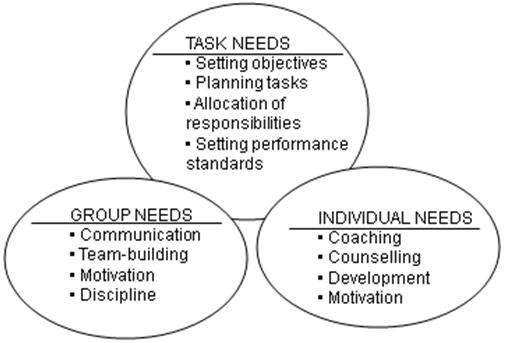掃碼下載APP
及時(shí)接收考試資訊及
備考信息

 新用戶掃碼下載
新用戶掃碼下載安卓版本:8.8.30 蘋果版本:8.8.30
開發(fā)者:北京正保會(huì)計(jì)科技有限公司
應(yīng)用涉及權(quán)限:查看權(quán)限>
APP隱私政策:查看政策>
HD版本上線:點(diǎn)擊下載>
c) Contingency Theories(權(quán)變理論)
Contingency theories are a class of behavioural theory that argues there is no single, best way of leading. The leader's ability to lead is contingent on various situational factors, including the leader's preferred style, the capabilities and behaviours of followers and other situational factors.
An effective leadership style in some situations may not be successful in others. An effect of this is that leaders who are very effective at one place and time may become unsuccessful either when transplanted to another situation or when the factors around them change.
權(quán)變理論領(lǐng)導(dǎo)力模型主要是根據(jù)不同的情況和不同的環(huán)境來決定用什么樣的領(lǐng)導(dǎo)方式,相信沒有單一且特定的領(lǐng)導(dǎo)方式,這就是權(quán)變理論的核心。
1. Action-Centred Leadership Model(行動(dòng)力中心理論領(lǐng)導(dǎo)力模型)
John Adair's action-centred leadership model is where task, group and individual needs are interconnected. The total situation dictates the relative priority which must be given to each of the three sets of needs. Effective leadership means identifying and acting on that priority to create a balance between the needs.

2. Fiedler's Contingency Theory of Leadership(Fiedler權(quán)變理論領(lǐng)導(dǎo)力模型)
Fiedler found that people become leaders partly because of their own attributes and partly because of the nature of the situation they find themselves in. Leadership style depends on the personality of the leader, which is fixed. The extent to which the situation favours the leader depends on three things:
Fiedler found that a task-oriented was most productive when the situation was either very favourable to the leader or very unfavourable.
In less extreme cases, a more people-centred approach was more effective.
3. Handy's "Best Fit" Approach(Handy的Best-fit理論)
Charles Handy's best fit approach identifies four factors which a successful leader must integrate:
| 1. The leader personality, character and style |
| 2. Subordinates individual and collective personalities and preference for style of leadership |
| 3. The task objectives, technology and methods of working |
| 4. The environment |
From the first three of these factors, Handy creates a spectrum ranging from "tight" to "flexible".
Handy's "best fit" occurs where all three factors are at the same point in the spectrum. Almost inevitably there will be a misfit, and change will be necessary. Any such change is invariably slow.
| Tight | Flexible | |
| Leader | • Preference for autocratic style • Arrogant and contemptuous of subordinates • Dislikes uncertainty |
•Preference for democratic style •Confident in subordinates •Dislikes stress •Accepts reasonable risk and uncertainty |
| Subordinates | • Low opinion of own abilities • Do not like uncertainty in their work and like to be ordered • Regard their work as trivial • Past experience in work leads to acceptance of orders • Cultural factors lean them towards autocratic/dictatorial leaders |
•High opinion of own abilities •Like challenging, important work •Prepared to accept uncertainty and longer timescales for results • Cultural factors favour independence |
| Task | • Job requires no initiative, routine and repetitive or has a certain outcome • Short timescale for completion • Trivial tasks |
•Important tasks with a longer timescale •Problem-solving or decision-making involved • Complex work |

歷年樣卷

考試大綱

詞匯表

報(bào)考指南

考官文章

思維導(dǎo)圖
 新用戶掃碼下載
新用戶掃碼下載安卓版本:8.8.30 蘋果版本:8.8.30
開發(fā)者:北京正保會(huì)計(jì)科技有限公司
應(yīng)用涉及權(quán)限:查看權(quán)限>
APP隱私政策:查看政策>
HD版本上線:點(diǎn)擊下載>

官方公眾號(hào)
微信掃一掃

官方視頻號(hào)
微信掃一掃

官方抖音號(hào)
抖音掃一掃
Copyright © 2000 - www.sgjweuf.cn All Rights Reserved. 北京正保會(huì)計(jì)科技有限公司 版權(quán)所有
京B2-20200959 京ICP備20012371號(hào)-7 出版物經(jīng)營許可證 ![]() 京公網(wǎng)安備 11010802044457號(hào)
京公網(wǎng)安備 11010802044457號(hào)
套餐D大額券
¥
去使用 主站蜘蛛池模板: 999精品全免费观看视频| 欧美一区二区三区欧美日韩亚洲| 亚洲人成色77777在线观看| 免费观看的av在线播放| 国产在线视频不卡一区二区| 久久精品国产热久久精品国产亚洲| 2019亚洲午夜无码天堂| 亚洲国产美国产综合一区| 亚洲av成人在线一区| 国产成人无码午夜视频在线观看| 色老头亚洲成人免费影院| 国产短视频精品一区二区| 日韩有码中文字幕av| 国产日韩一区二区四季| 光棍天堂在线手机播放免费| 无码一区二区三区久久精品| 超碰伊人久久大香线蕉综合| XXXXXHD亚洲日本HD| 精品久久久久久中文字幕| 日韩精品一区二区三区在| 精品一区二区三区在线视频观看| 国自产拍偷拍精品啪啪模特| 久久精品国产88精品久久| 亚洲国产成人资源在线| 337p粉嫩大胆噜噜噜| 人妻加勒比系列无码专区| 国产精品视频一品二区三| 亚洲国产精品久久久久婷婷图片| 久久久精品94久久精品| 亚洲综合精品香蕉久久网| 国产精品无码成人午夜电影| 性欧美乱熟妇xxxx白浆| 日本一区二区久久人妻高清| 亚洲男人天堂2021| 精品一区二区免费不卡| 亚洲午夜香蕉久久精品| 国产精品白嫩初高生免费视频| 成人啪精品视频网站午夜| 精品国产欧美一区二区三区在线| 少妇激情av一区二区三区| 无码AV无码免费一区二区|